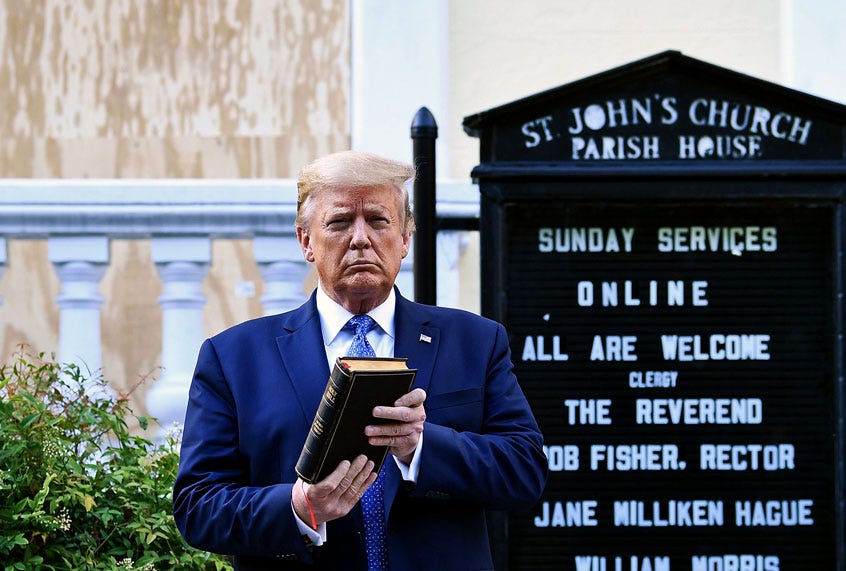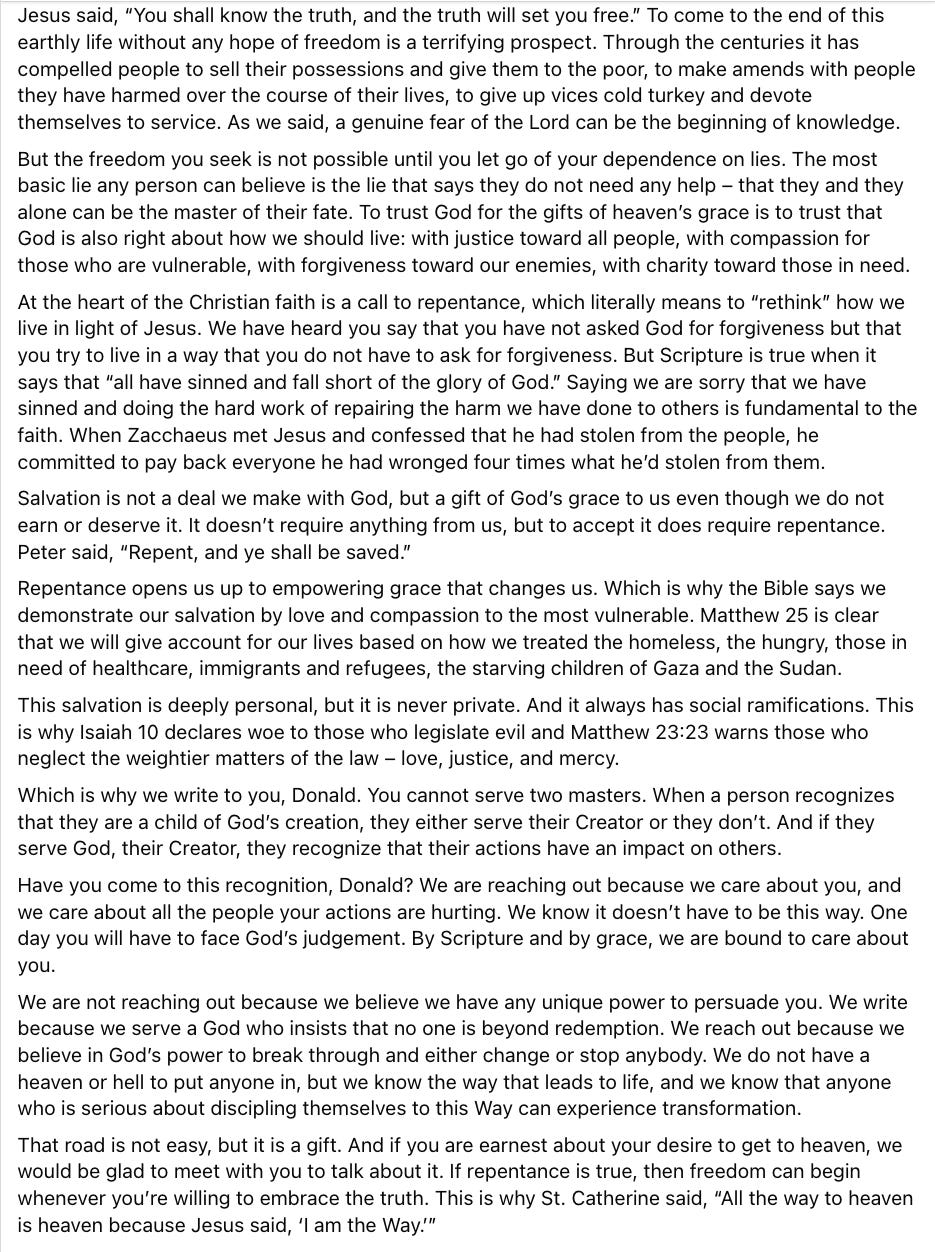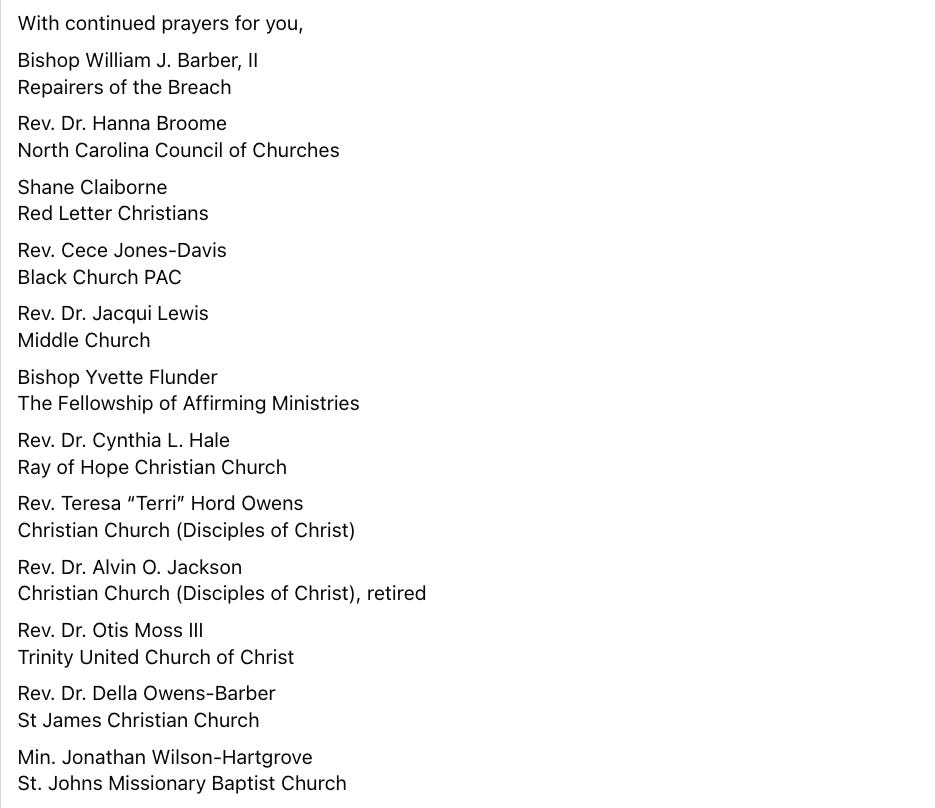the Empathy List #154: Donald Trump at the Pearly Gates?
And what does DT's version of heaven look like, anyway?
Hi friends, Liz here.
At the end of August, the President of the United States told Fox and Friends he’s hoping to make it to heaven—and that if he can only stop the bombing between Russia and Ukraine, well then, he might have a chance.
“I want to end it. … if I can save 7,000 people a week from being killed, I think that’s a pretty [good] — I want to try to get to heaven if possible. I’m hearing I’m not doing well,” he said. “I hear I’m really at the bottom of the totem pole. But if I can get to heaven, this will be one of the reasons.”
This was a curious statement out of the mouth of a man whose crimes of sexual assault have been both thoroughly documented and covered up. (Though, it turns out, the fighter jets that flew over the news conference Epstein survivors held where they asked congress to release the files? Those jets were co-incidental, not related to silencing the voices of victims. Supposedly). Not to mention the business fraud. Or the lying, oh so much lying.
What does it take to “get to heaven,” according to the Chief Officer of the United States? Ending war. He’s already stopped six or seven, according to his count, and if true, that is an accomplishment. Saving any life—each one sacred and known to God—is a profound gift. And Trump’s desire for peace is right and good.
But, of course, though Trump has brokered deals, he has ended neither of the most dramatic conflicts plaguing the world. And since he’s publicly said that his ending-of-cage-matches-between-nations should come with a Nobel Peace prize, well, that torpedos his credibility a tad.
And there’s one more thing: Trump sent out a fundraising email asking for help… “getting into heaven.” He told supporters, if only he can raise just $15 from you and you and you, then he can complete the mission God gave him as governor of the Empire itself. Why else would God have saved his life from that errant bullet last year? He is a g-d damn walking miracle, and don’t you forget it.
I admit, I am angry. I do not take the bastardization of my religion lightly. Trump cares about himself, not about heaven, I think.
It is too easy to write off this statement of Trump’s as one more vapid, self-serving nod to the religion of my youth, a bone thrown to distract the evangelicals from his other more glaring sins, rather than as sincere desire from the president.
But Karoline Leavett, his super hot soccer mom press secretary, confirmed the president’s statement: “I think the president was serious,” she said. “I think the president wants to get to heaven — as I hope we all do in this room as well.”
And so I want to take the words seriously for a minute. If Trump does want to enter heaven, well then, what does Trump’s heaven look like, smell like, taste like? How does it operate? And who sits at the head of the banquet table, host of the feast? Who walks through the gates? What’s the appeal of heaven to a kazillionaire who seems to possess no conscience?
I’ve already written once this month about my own vision of heaven and hell. Despite my lean to the theological left, I do still hold a conception of both, which I believe lines up with the abstract idea of heaven and hell within the Bible. (Which is to say, we do not have much concrete information about either heaven or hell, so I’ve taken some liberties. As do we all. 🙃)
But I bet that my idea of heaven and Donald’s do not line up. If Donald’s heaven includes unfettered power, limitless use and abuse of women and immigrants and the poor, if it only welcomes the rich or excludes those who disagree with him, or if Donald envisions pools of gold coins in which he can practice his Scrooge McDuck impression, then, I suspect he will be disappointed with the reality.
The Bible doesn’t say much about heaven, but it does contain some uncomfortable stories about the afterlife, including a parable about the mythic “Abraham’s Bosom” (which is a sort of purgatory middle space between the two).
In Luke 16, Jesus tells this story:
“19 ‘There was a rich man who was dressed in purple and fine linen and lived in luxury every day. 20 At his gate was laid a beggar named Lazarus, covered with sores 21 and longing to eat what fell from the rich man’s table. Even the dogs came and licked his sores.
22 “The time came when the beggar died and the angels carried him to Abraham’s side. The rich man also died and was buried. 23 In Hades, where he was in torment, he looked up and saw Abraham far away, with Lazarus by his side. 24 So he called to him, ‘Father Abraham, have pity on me and send Lazarus to dip the tip of his finger in water and cool my tongue, because I am in agony in this fire.’
25 “But Abraham replied, ‘Son, remember that in your lifetime you received your good things, while Lazarus received bad things, but now he is comforted here and you are in agony. 26 And besides all this, between us and you a great chasm has been set in place, so that those who want to go from here to you cannot, nor can anyone cross over from there to us.’
27 “He answered, ‘Then I beg you, father, send Lazarus to my family, 28 for I have five brothers. Let him warn them, so that they will not also come to this place of torment.’
29 “Abraham replied, ‘They have Moses and the Prophets; let them listen to them.’
30 “‘No, father Abraham,’ he said, ‘but if someone from the dead goes to them, they will repent.’
31 “He said to him, ‘If they do not listen to Moses and the Prophets, they will not be convinced even if someone rises from the dead.’”
They will not listen, they will not hear, they will not change, says Abraham of the rich bros, not even if someone beats death itself.
I wonder how Donald—or the spiritual sycophants that surround him— would interpret this parable from the mouth of God.
Another example: to the rich young real estate mogul, Jesus says, this one thing you lack: sell everything and give what you have to the poor. Then you will inherit a place with God.
In St. Basil’s “Sermon to the Rich,” an exposition of the story of the young ruler and Jesus, he speaks directly to the rich of his day:
“Tell me, what better service do silver beds and silver tables, ivory sofas and ivory chairs provide, when because of these things wealth fails to pass over to the poor, and thousands huddle about the door, all of them letting loose a miserable howl? You, however, refuse to give, declaring that it’s impossible to satisfy those who ask. With your tongue you excuse yourself, but by your own hand you’re convicted; for even in silence your hand proclaims your falsehood, sparkling round from the ring on your finger. How many people could one of your fingers release from debt? How many broken-down homes could be rebuilt? One box of your clothing would be able to dress the whole shivering populace; but you, unfeeling, dismiss the needy, not fearing the just repayment of the Judge. You have not shown mercy, you shall not receive mercy; you’ve not opened your home, you shall be evicted from the kingdom. You haven’t given of your bread; neither shall you receive eternal life.”
One thing is very clear about the wealthy bully of the Americas: he has not devoted himself to relieving the pain, anxiety, and anguish of the poor. And that seems to disqualify him from heaven.
That said, even if he ends up there—as I hope every one of us will, because how can we wish even our greatest enemy into hell?—Donald will not be the boss of heaven. Donald will not win the trophies of heaven. Donald will not have the ability to fire whomever he likes from heaven. If Donald goes to heaven, it will be because Donald has learned to accept his own limits, Donald has learned how to say sorry and make reparations for his wrongs, and Donald has learned a new way to be.
I hate to tell you this, Donald, but that means standing at the back of the line, no cutting, and no angles. Just pure humility.
And if that’s how someone gets to heaven, as I suspect it is based on the model of Jesus, well then, Donald, I have some bad (or good?) news for you.
Part of what interests me about this question of Donald “getting into heaven” is that it reveals that even the most despised among us wonder about our mortality and the moral state of our selves. What makes us worthy of paradise, if there even is an eternal place to go after our bodies expire and decay? What makes us unworthy? What makes us good or bad? What “totem pole” measures our being, when the end of life does arrive? (It always arrives.)
These are the questions that have concerned philosophers and theologians across human history. And despite having left the evangelical church, I still believe in the fundamental ideas of morality: “Do unto others, as you would have them do unto you.”
That is goodness, me actively doing kindness to you first. That is the Bible, the history of the church, the nature of God in a nutshell. And the reason I still follow Jesus is because Jesus modeled it for me. When doing good for someone else meant that Jesus himself lost out, even to his own harm, he did good anyway.
I cannot and will not stand beside or behind almost any man in the history of the world, but I can stand with a man like that.
The other part of this story that interests me is what came after, when a group of progressive Christians wrote Donald back.
Unlike my initial rage, cynicism, and dismissiveness about Mr. Pres’s expression toward God, my fellow progressive Christians at Red Letter Christians attempted to take him seriously. My prayers for he-who-shall-not-be-named have, I confess, looked more like a wavy middle finger at the sky, the radio, and toward the general direction of Washington, D.C. I have leaned into the imprecatory psalms, asking for the demise of a man whose policies have devastated many people. This letter does not shy away from those realities.
Yet these faith leaders—many of whom are well known activists and theologians within the Black American church tradition—do not stop with anger. With this letter, they are reaching out a hand toward the most powerful and narcissistic man in the room, and I’d argue they are doing it without any hope of him taking their hand in return.
Probably its writers have mixed motivations. And probably he won’t hear them or pay any attention. But does that make their action meaningless?
Why try to change another’s mind, especially someone like Donald?
Theologically, Christians believe that people can change fundamentally, that our instincts and desires and personalities can undergo dramatic overhaul for the better, that we can leave behind our addictions, fears, and abuse (the abuse others have committed toward us and the abuse we have perpetrated).
Sometimes, like a good Christian, I believe such change is possible, while at other times, I doubt. I doubt to the tune of my eyes rolled into the back of my skull so hard I’m not sure I’ll be able to return them to their front-facing position.
And I do not know if Donald can change or not. I do not know what the next steps for Donald would be, in making things right with God and the whole entire world.
Zaccheus, who the writers mention above, gave away every bit of wealth and power he had, offering quadruple reparations for the harm he had committed against others. I suspect the type of change that would be required of Donald would be as costly.
But God made Donald. God knows Donald. And possibly, God can still invite Donald to dramatic change, perhaps even in the afterlife. (Not sure how it works, but maybe?). At the very least, I can be certain that God does not abandon God’s creatures. Even now, God is reaching out God’s own hand—still, even after everything.
And if God reaches out God’s hand, do I? Am I the kind of person who hopes for reconciliation above revenge? What kind of person do I hope to be?
I hope that even after everything, I remain tender to the hope God offers. And that may mean reaching out my hand to a man I hate.
God, help me.
Thanks for reading, my friends.









